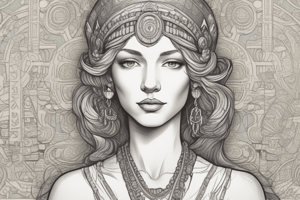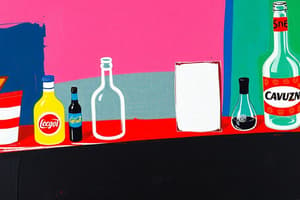Podcast
Questions and Answers
What is primarily considered an individual's or company's most valuable asset?
What is primarily considered an individual's or company's most valuable asset?
- Product formulas
- Market capitalizations
- Tangible assets
- Reputation (correct)
How did Coca-Cola establish its brand loyalty?
How did Coca-Cola establish its brand loyalty?
- By selling soft drinks at lower prices
- Through consistent provision of exceptional products and services (correct)
- By diversifying into unrelated industries
- By patenting its formula
What lesson is emphasized regarding the maintenance of one's reputation?
What lesson is emphasized regarding the maintenance of one's reputation?
- It is static once established
- It must be earned continuously and can be lost quickly (correct)
- It is only dependent on external factors
- It can be acquired without effort
What is the primary purpose of trademarks during the Roman Empire?
What is the primary purpose of trademarks during the Roman Empire?
What does brand loyalty often rely on, according to the discussion?
What does brand loyalty often rely on, according to the discussion?
How did branding develop from the Stone Age to modern times?
How did branding develop from the Stone Age to modern times?
How did Bill Cosby establish his brand name in the entertainment industry?
How did Bill Cosby establish his brand name in the entertainment industry?
What was a significant consequence of the emergence of branded products for consumers?
What was a significant consequence of the emergence of branded products for consumers?
What is a key requirement for someone who wants to build their personal brand?
What is a key requirement for someone who wants to build their personal brand?
What role did merchant’s marks play in the 14th to 17th centuries?
What role did merchant’s marks play in the 14th to 17th centuries?
What might jeopardize an individual’s or a company’s reputation?
What might jeopardize an individual’s or a company’s reputation?
In modern branding, what does a brand name typically signify?
In modern branding, what does a brand name typically signify?
What historical period saw the use of 'maker’s marks' in Latin literature?
What historical period saw the use of 'maker’s marks' in Latin literature?
During which period did brands begin to influence areas beyond consumer goods, such as banking and health care?
During which period did brands begin to influence areas beyond consumer goods, such as banking and health care?
What social factor significantly contributed to the increased dependence on brand names in modern times?
What social factor significantly contributed to the increased dependence on brand names in modern times?
Flashcards
Branding's Origin
Branding's Origin
Branding, identifying products with marks, dates back to the Stone Age (around 5000 B.C.)
Early Trademarks
Early Trademarks
By the Roman Empire (500 B.C. - A.D. 500), trademarks were common on various goods (e.g., cheese, wine).
Guilds and Trademarks
Guilds and Trademarks
Merchants in guilds couldn't advertise, so trademarks ensured product quality by identifying the maker.
Merchant's Mark
Merchant's Mark
Signup and view all the flashcards
Modern Brand Significance
Modern Brand Significance
Signup and view all the flashcards
Brand and Reputation
Brand and Reputation
Signup and view all the flashcards
Consumer Reliance on Brands
Consumer Reliance on Brands
Signup and view all the flashcards
Brand's Role in Modern Commerce
Brand's Role in Modern Commerce
Signup and view all the flashcards
Brand Reputation
Brand Reputation
Signup and view all the flashcards
Brand Value
Brand Value
Signup and view all the flashcards
Building a Brand
Building a Brand
Signup and view all the flashcards
Brand Loyalty
Brand Loyalty
Signup and view all the flashcards
Reputation and Integrity
Reputation and Integrity
Signup and view all the flashcards
Customer Loyalty
Customer Loyalty
Signup and view all the flashcards
Reputation as an Asset
Reputation as an Asset
Signup and view all the flashcards
Study Notes
Branding: A Historical and Modern Perspective
- Branding has ancient origins, appearing on pottery around 5000 BC and in cave drawings.
- Early Roman Empire documents show widespread use of maker's marks on various goods, like cheese, wine, and lamps. This allowed early consumers to judge quality based on a maker's reputation.
Modern Branding Principles
- Modern brands, unlike past maker's marks, emphasize uniform quality and instill goodwill.
- Brand names are vital for consumers in today's complex marketplace, offering assurances of quality and saving time. Customers increasingly rely on brands and fewer retailers.
- Brand reputation is synonymous with company reputation, affecting banking, investments, and healthcare.
- Jesus' parable of Matthew 12:33 (good tree, good fruit) highlights the importance of reputation in choosing vendors.
- Brands are a company's most valuable assets in the global marketplace.
Coca-Cola as a Case Study
- Coca-Cola’s brand name, not the formula (never patented), is its core value.
- Its market capitalization is based more on brand than tangible assets.
- Brand loyalty is a necessary product of reputation, earned through consistent quality and service.
Building Personal Brands
- Individuals can also build personal brands, much like companies.
- Fame and accolades (e.g., Bill Cosby) can elevate one’s standing as a product.
- Artists, writers, and professionals (Oprah Winfrey, Donna Karan) demonstrate building powerful brands.
- Exceptional work & reputation are crucial for local experts (restaurant owner, dentist) and employees can also build these brand identities (top salesperson, buyer, etc.)
- Your reputation is your most valuable asset.
Maintaining Reputation
- Maintaining a good reputation is crucial for sustained success.
- Quality and service must never be compromised, even in minor tasks, as per Jesus' words in Luke 16:10 (loyalty in small things determines loyalty in larger ones).
- Word-of-mouth referrals from satisfied customers are imperative to enhance a brand.
- Companies (like World Wide Technology) should be willing to invest in reputation-building even when it exceeds normal expectations.
Studying That Suits You
Use AI to generate personalized quizzes and flashcards to suit your learning preferences.
Description
Explore the evolution of branding from ancient civilizations to modern markets. This quiz examines the historical significance of branding, the principles guiding modern branding, and offers a case study of Coca-Cola. Test your knowledge on how branding has shaped consumer behavior and company reputation over time.




